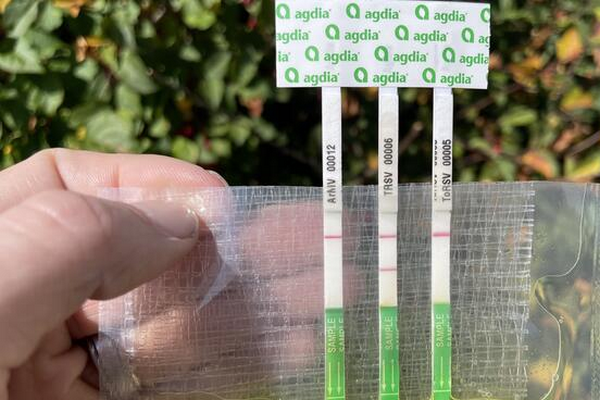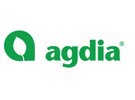Agdia, Inc. has announced the addition of a new product to its ImmunoComb line to help growers detect and combat plant viruses that cause similar symptoms and share nematodes as a common vector. The new Nematode Viruses ImmunoComb brings together three existing ImmunoStrips in one format.
Common symptoms require accurate testing for diagnosis
Arabis mosaic virus (ArMV), Tobacco ringspot virus (TRSV), and Tomato ringspot virus (ToRSV) are all commonly spread by nematodes and can cause similar yellowing symptoms on many plant species in the form of mosaic pattern ringspots, yellow line-patterns, and general chlorosis. Such visual similarities in the presence of a common vector underscore the unreliability of visually identifying the causal pathogen, further emphasizing the need for reliable and easy-to-use onsite diagnostic test methods.
Arabis mosaic virus (ArMV)
Arabis mosaic virus (ArMV) is a member of the Nepovirus genus known for its transmission by nematodes. It is the causal agent of raspberry yellow dwarf disease in raspberries and infects a wide range of other crops including other fruits such as grapevines & strawberries in addition to vegetables, ornamentals, and cannabis (hemp). While some infected plants may be asymptomatic, Arabis mosaic virus can cause a wide range of symptoms including stunting, leaf deformation, mottling & flecking.
Agdia's ImmunoStrip for Arabis mosaic virus has been shown to successfully detect several isolates of ArMV with 100% diagnostic sensitivity observed during product validation studies. Out of 62 other viruses tested, this assay only cross-reacted with Grapevine fleck virus (GFkV). Hundreds of host species were tested with an overall diagnostic specificity of over 99%.

Tobacco ringspot virus (TRSV)
Tobacco ringspot virus (TRSV) is also a member of the genus Nepovirus and can infect a wide range of ornamental, fruit, vegetable, and field crops. Notable hosts include soybeans, perennial herbs, cucurbits, blackberries, and blueberries. It can be spread mechanically, through infected seeds, as well as by nematodes and a variety of insects. The most common symptom of Tobacco ringspot virus infection is the presence of chlorotic ringspots. Depending on the host and the severity of the infection, up to 100% crop loss can occur.
Agdia's ImmunoStrip for Tobacco ringspot virus was designed to detect all strains and isolates of TRSV. The diagnostic sensitivity of this test is 100% (all fifteen distinct TRSV-infected samples tested during product validation studies were detected). Diagnostic specificity was 100% out of over 100 host samples tested. No cross-reactivity to other viral species was observed.
Tomato ringspot virus (TRSV)
Tomato ringspot virus (ToRSV) is another member of the genus Nepovirus infecting many species such as raspberries, peaches, cherries, cucumbers, tomatoes, cowpea & many others. Common diseases include yellow vein disease in grapes, yellow bud mosaic in peaches & more. In addition to nematode transmission, the virus can also be spread by seed in certain species.
Agdia's ImmunoStrip for Tomato ringspot virus was designed to detect all strains and isolates of ToRSV. The diagnostic sensitivity of this test is 100% (all sixteen distinct ToRSV-infected samples tested during product validation studies were detected). The diagnostic specificity for this assay is over 97%.
For more information:
Agd ia
ia
52642 County Road 1
Elkhart, IN 46514
phone 1-574-264-2615
fax 1-574-264-2153
info@agdia.com
www.agdia.com
